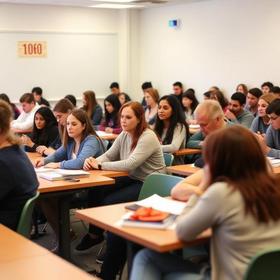- San Antonio College is a public community college which provides for and supports the educational and lifelong learning needs of a multicultural community. As a leader in education, San Antonio College is committed to excellence in helping students reach their full potential by developing their academic competencies, critical thinking skills, communication proficiency, civic responsibility and global awareness.
School Highlights
San Antonio College serves 28,151 students (16% of students are full-time).
The college's student-teacher ratio of 32:1 is higher than the state community college average of 23:1.
Minority enrollment is 82% of the student body (majority Hispanic), which is more than the state average of 74%.
Quick Facts (2026)
- Enrollment: 28,151 students
- In-state tuition: $5,550
- Out-state tuition: $10,740
- Student-teacher ratio: 32:1
- Minority enrollment: 82%
- Source: Integrated Postsecondary Education Data System (IPEDS)
Top Rankings
San Antonio College ranks among the top 20% of public schools in Texas for:
Category
Attribute
Community Size
School Overview
The teacher population of 867 teachers has stayed relatively flat over five years.
San Antonio College
(TX) Community College Avg.
Carnegie Classification
Associate's Colleges: High Transfer-Mixed Traditional/Nontraditional
Baccalaureate/Associate's Colleges: Associate's Dominant
Institution Level
Four or more years
At least 2 but less than 4 years
Institution Control
Public
Public
Colors
Black, Blue, Red
Total Faculty
867 staff
262 staff
School Calendar
Student Body
The student population of San Antonio College has grown by 46% over five years.
The student-teacher ratio of 32:1 has increased from 31:1 over five years.
The San Antonio College diversity score of 0.50 is less than the state average of 0.70. The school's diversity has declined by 11% over five years.
Total Enrollment
28,151 students
4,931 students
Student-Teacher Ratio
32:1
23:1
# Full-Time Students
4,461 students
909 students
# Part-Time Students
23,690 students
4,022 students
# Enrollment Undergraduate
281 students
403 students
# Full-Time Undergraduate Students
4,461 students
890 students
# Full-Time Graduate Students
n/a
40 students
# Part-Time Undergraduate Students
23,690 students
4,166 students
# Part-Time Graduate Students
n/a
47 students
Total Dormitory Capacity
n/a
252 students
% American Indian/Alaskan
n/a
n/a
% Asian
3%
6%
% Hispanic
68%
46%
% Black
7%
13%
% White
18%
26%
% Hawaiian
n/a
n/a
% Two or more races
3%
3%
% Non Resident races
n/a
2%
% Unknown races
n/a
4%
Diversity Score
0.50
0.70
College Completion Rate (Students who graduate in less than 4 years)
26%
55%
College Completion Rate (Students who graduate in 4 years or more than 4 years)
26%
34%
Average Graduate Earnings (10 Years)
$33,800
$34,600
Tuition and Acceptance Rate
The public in-state tuition of $5,550 is more than the state average of $3,764. The in-state tuition has declined by 15% over four years.
The public out-state tuition of $10,740 is more than the state average of $6,054. The out-state tuition has declined by 23% over four years.
In-State Tuition Fees
$5,550
$3,764
Out-State Tuition Fees
$10,740
$6,054
% Students Receiving Some Financial Aid
81%
84%
Median Debt for Graduates
$10,409
$10,765
Median Debt for Dropouts
$5,500
$5,500
Acceptance Rate
n/a
84%
Source: 2024 (or latest year available) Integrated Postsecondary Education Data System (IPEDS)
School Notes
- School Mascot: The Ranger, Armadillo
- In support of the mission of the Alamo Community College District, San Antonio College responds to Bexar County's diverse community by providing high quality general education, liberal arts and sciences, career education, continuing education and developmental education. The college has an average semester enrollment of 21,000 credit students and an average annual enrollment of 16,000 other-than-credit students. San Antonio College is the largest single-campus community college in Texas and one of the largest in the United States. San Antonio College offers a comprehensive liberal arts curriculum designed to satisfy the requirements of the first two years of a baccalaureate degree. Founded in 1925 as the University Junior College, San Antonio College is the oldest two-year college in the state never operated as a private institution. Under control of the University of Texas for the first year, the college held afternoon and evening classes at the old Main Avenue High School. Control of the college was transferred in 1926 to the San Antonio Independent School District, and the name was changed to San Antonio Junior College. Operations were relocated to a downtown location at the German-English school on South Alamo Street. In 1978, the District's name was changed to the San Antonio Community College District, and in 1982 it was renamed the Alamo Community College District. Today, San Antonio College is one of the largest single-campus community colleges in the country and the largest single-campus college in the State of Texas, enrolling over 22,000 students. San Antonio College is approved and accredited by the Southern Association of Colleges and Schools, the Association of Texas Colleges and Universities, the American Dental Association Commission on Dental Accreditation, the American Association of Medical Assistants (AAMA) in conjunction with the Commission on Accreditation of Allied Health Education Programs (CAAHEP), the Texas Educational Theatre Association, the Texas Association of Music Schools, the National League for Nursing, the Board of Nurse Examiners for the State of Texas, the American Board of Funeral Service Education and the Community College Journalism Association.
Frequently Asked Questions
How much does San Antonio College cost?
San Antonio College's tuition is approximately $5,550 for In-State students and $10,740 for Out-State students.
What is San Antonio College's ranking?
San Antonio College ranks among the top 20% of community college in Texas for: Largest student body.
In what neighborhood is San Antonio College located?
San Antonio College is located in the Tobin Hill neighborhood of San Antonio, TX.
Recent Articles

Part-Time vs. Full-Time Enrollment in 2025: Which Is Better?
Explore part-time vs. full-time enrollment in 2025, comparing costs, flexibility, outcomes, and goals to help students choose the right path.

How Community Colleges Use AI Tools to Support Student Success
Explore how community colleges are using AI tools in 2025 to improve advising, learning, retention, and student success.

Nontraditional Student’s Guide to Community College 2025
Comprehensive guide for nontraditional students at community college with updated tuition, support, careers, and success strategies for 2025.









